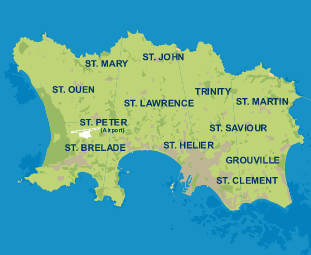
On my last visit to Jersey, I was a mere 13 years old, visiting my grandfather for what turned out to be the last time. It took me (and my brother) nineteen years to return, so a spirit of nostalgia was inevitable. Certainly there've been a lot of changes there in the interim, but for all that, a great many things were familiar to us the moment I saw them. For instance, I wasn't sure I'd be able to find my grandparents' flat, yet once I was on the right road it all returned to me.
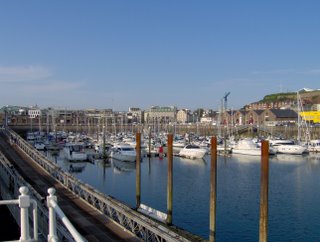
Landing on Jersey after such a long absence proved quite an adrenaline rush which the long wait for a bus into St Helier, the island's capital, failed to dampen. Even as we travelled the five or so miles from the airport, I was formulating a plan for a camping trip with my friend Dan, quite possibly in the early summer next year, a plan I still intend to see bear fruit. That, combined with the brevity of my stay (not even 48 hours), should be proof enough of how much I enjoyed those couple of days.

Many objects jostle for space on the St Helier skyline: there's a lot of construction going on at present, so cranes would dominate if it weren't for Fort Regent (left), a leisure centre which spreads over the rock of the same name, bringing to my mind a malevolent spider. (If you doubt its evil intentions, consider but the fact it's most likely responsible for the absence of the playground my brother and I frequented as children. The windy snake slide is sorely missed.)

If you're coming into Jersey by ferry, however, chances are among the first sights to greet you will be Elizabeth castle, built just a little out to sea. Like the Mont-St-Michel off the coast of Brittany, the high tide makes this peninsular inaccessible at night but, unlike its French cousin, is (to the best of my knowledge) uninhabited and probably uninhabitable.

Being such a small island - about 9 miles by 5 - it's not surprising nautical activities should be of such importance. Besides long stretches of sandy beaches, yachting and sailing in general are popular activities, if even the dry docks are this full.
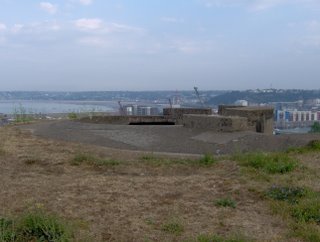
And there's no shortage of history here either, perhaps dominated by the Channel Islands' status as the only parts of the British Isles to have been occupied by the Nazis during the Second World War. There are many reminders of this, most prominent of these being the underground hospital, part of a system of tunnels built at the time, and, at stragetic points, fortifications such as this one. My brother, on our last visit, bought a book entitled
Jersey under the jackboot which he found rather hard going, but I imagine he'll be giving it another go now.
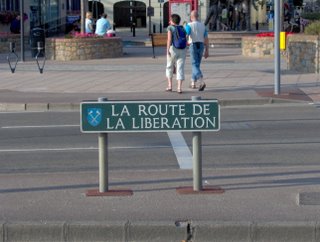
Putting aside the historical significance of street names such as these, the Islands' proximity to France (where they are known as
les îles anglo-normandes) means that the French language has made more headway here than anywhere else in the UK, to the likely despair of anti-Europeans. Place names in French are not uncommon and there's even a local dialect,
Jerriais, a conglomeration of French and English, one of those little-spoken languages constantly fighting for survival. That said, the number of Portuguese immigrants (accounting for a high proportion of unskilled labour on the island) would suggest a shift in linguistic dominance.

Enough of the guidebook stuff and on to the nostalgia. This was the sight that really brought memories flooding back: Howard Davis park, with its shaded paths, the bandstand overlooking an enormous lawn, the ponds and, of vital importance to a child, the shop across the road where we bought Smarties knowing we'd be vying each other for the orange ones. Ah, memories ...
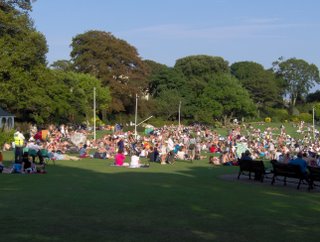



For all that, Jersey is still capable of surprises, as this picture of the morris dancers we happened upon on my last evening amply demonstrates!
 On my last visit to Jersey, I was a mere 13 years old, visiting my grandfather for what turned out to be the last time. It took me (and my brother) nineteen years to return, so a spirit of nostalgia was inevitable. Certainly there've been a lot of changes there in the interim, but for all that, a great many things were familiar to us the moment I saw them. For instance, I wasn't sure I'd be able to find my grandparents' flat, yet once I was on the right road it all returned to me.
On my last visit to Jersey, I was a mere 13 years old, visiting my grandfather for what turned out to be the last time. It took me (and my brother) nineteen years to return, so a spirit of nostalgia was inevitable. Certainly there've been a lot of changes there in the interim, but for all that, a great many things were familiar to us the moment I saw them. For instance, I wasn't sure I'd be able to find my grandparents' flat, yet once I was on the right road it all returned to me. Landing on Jersey after such a long absence proved quite an adrenaline rush which the long wait for a bus into St Helier, the island's capital, failed to dampen. Even as we travelled the five or so miles from the airport, I was formulating a plan for a camping trip with my friend Dan, quite possibly in the early summer next year, a plan I still intend to see bear fruit. That, combined with the brevity of my stay (not even 48 hours), should be proof enough of how much I enjoyed those couple of days.
Landing on Jersey after such a long absence proved quite an adrenaline rush which the long wait for a bus into St Helier, the island's capital, failed to dampen. Even as we travelled the five or so miles from the airport, I was formulating a plan for a camping trip with my friend Dan, quite possibly in the early summer next year, a plan I still intend to see bear fruit. That, combined with the brevity of my stay (not even 48 hours), should be proof enough of how much I enjoyed those couple of days. Many objects jostle for space on the St Helier skyline: there's a lot of construction going on at present, so cranes would dominate if it weren't for Fort Regent (left), a leisure centre which spreads over the rock of the same name, bringing to my mind a malevolent spider. (If you doubt its evil intentions, consider but the fact it's most likely responsible for the absence of the playground my brother and I frequented as children. The windy snake slide is sorely missed.)
Many objects jostle for space on the St Helier skyline: there's a lot of construction going on at present, so cranes would dominate if it weren't for Fort Regent (left), a leisure centre which spreads over the rock of the same name, bringing to my mind a malevolent spider. (If you doubt its evil intentions, consider but the fact it's most likely responsible for the absence of the playground my brother and I frequented as children. The windy snake slide is sorely missed.) If you're coming into Jersey by ferry, however, chances are among the first sights to greet you will be Elizabeth castle, built just a little out to sea. Like the Mont-St-Michel off the coast of Brittany, the high tide makes this peninsular inaccessible at night but, unlike its French cousin, is (to the best of my knowledge) uninhabited and probably uninhabitable.
If you're coming into Jersey by ferry, however, chances are among the first sights to greet you will be Elizabeth castle, built just a little out to sea. Like the Mont-St-Michel off the coast of Brittany, the high tide makes this peninsular inaccessible at night but, unlike its French cousin, is (to the best of my knowledge) uninhabited and probably uninhabitable. Being such a small island - about 9 miles by 5 - it's not surprising nautical activities should be of such importance. Besides long stretches of sandy beaches, yachting and sailing in general are popular activities, if even the dry docks are this full.
Being such a small island - about 9 miles by 5 - it's not surprising nautical activities should be of such importance. Besides long stretches of sandy beaches, yachting and sailing in general are popular activities, if even the dry docks are this full. And there's no shortage of history here either, perhaps dominated by the Channel Islands' status as the only parts of the British Isles to have been occupied by the Nazis during the Second World War. There are many reminders of this, most prominent of these being the underground hospital, part of a system of tunnels built at the time, and, at stragetic points, fortifications such as this one. My brother, on our last visit, bought a book entitled Jersey under the jackboot which he found rather hard going, but I imagine he'll be giving it another go now.
And there's no shortage of history here either, perhaps dominated by the Channel Islands' status as the only parts of the British Isles to have been occupied by the Nazis during the Second World War. There are many reminders of this, most prominent of these being the underground hospital, part of a system of tunnels built at the time, and, at stragetic points, fortifications such as this one. My brother, on our last visit, bought a book entitled Jersey under the jackboot which he found rather hard going, but I imagine he'll be giving it another go now. Putting aside the historical significance of street names such as these, the Islands' proximity to France (where they are known as les îles anglo-normandes) means that the French language has made more headway here than anywhere else in the UK, to the likely despair of anti-Europeans. Place names in French are not uncommon and there's even a local dialect, Jerriais, a conglomeration of French and English, one of those little-spoken languages constantly fighting for survival. That said, the number of Portuguese immigrants (accounting for a high proportion of unskilled labour on the island) would suggest a shift in linguistic dominance.
Putting aside the historical significance of street names such as these, the Islands' proximity to France (where they are known as les îles anglo-normandes) means that the French language has made more headway here than anywhere else in the UK, to the likely despair of anti-Europeans. Place names in French are not uncommon and there's even a local dialect, Jerriais, a conglomeration of French and English, one of those little-spoken languages constantly fighting for survival. That said, the number of Portuguese immigrants (accounting for a high proportion of unskilled labour on the island) would suggest a shift in linguistic dominance. Enough of the guidebook stuff and on to the nostalgia. This was the sight that really brought memories flooding back: Howard Davis park, with its shaded paths, the bandstand overlooking an enormous lawn, the ponds and, of vital importance to a child, the shop across the road where we bought Smarties knowing we'd be vying each other for the orange ones. Ah, memories ...
Enough of the guidebook stuff and on to the nostalgia. This was the sight that really brought memories flooding back: Howard Davis park, with its shaded paths, the bandstand overlooking an enormous lawn, the ponds and, of vital importance to a child, the shop across the road where we bought Smarties knowing we'd be vying each other for the orange ones. Ah, memories ...


 For all that, Jersey is still capable of surprises, as this picture of the morris dancers we happened upon on my last evening amply demonstrates!
For all that, Jersey is still capable of surprises, as this picture of the morris dancers we happened upon on my last evening amply demonstrates!


5 Comments:
I want to go there now!
By Miss Scarlet, at 7/7/06 16:09
Miss Scarlet, at 7/7/06 16:09
If you travel often, then an iPod is definitely the solution. Enjoy it! Being oldfashioned has also its charms, so I really don't fear nor mind.
If you happen to be into British baroc music, check (again) «Dido & Aeneas» by Purcell, particularly that overwhelming «Remember me, but ah forget my fate». (I'm listening to it this instant!). Dido by Jesse Norman. Dear Lord, it's much more than I can bear...
(Fabulous pics, wonderful little place, first class covering piece!)
By Anonymous, at 8/7/06 18:18
Anonymous, at 8/7/06 18:18
Wow, it's so beautiful! I like your Jersey better than ours.
By Andy, at 8/7/06 21:20
Andy, at 8/7/06 21:20
Scarlet and Andy: Thank heavens the authorities keep tight tabs on immigration, otherwise I'd worry about having started something!
Ricardo: René Jacobs' recording of Dido is already on my iPod. Not too keen on Jessye Norman in that repertoire; her voice is too rich in vibrato to be well-suited to that repertoire, at least for my liking.
By Anthony, at 8/7/06 22:42
Anthony, at 8/7/06 22:42
In that case, which is ok with me aswell, I'll give you two other names, no doubt less known, but more to my liking too: Wilke Te Brummelstroete as Dido, and Tom Sol as Aeneas. It's the Koorproject Rotterdam. It's just the way I like it: softer than Jesse Norman. I don´t know the René Jacobs' recording. Another one, though, I like is by Ricercar Consort.
Nice weekend!
By Anonymous, at 9/7/06 00:12
Anonymous, at 9/7/06 00:12
Post a Comment
<< Home